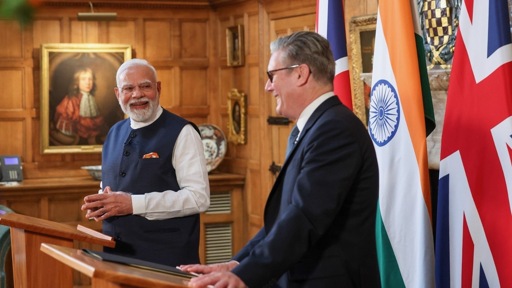Claiming it will lead to new forms of colonialism in the country, All India Kisan Sabha (AIKS), India’s largest farmer’s organization, has demanded that the Indian government suspend the recently signed free trade agreement with the UK.
Contradicting the government’s claims that the deal will benefit the common farmer, AIKS pointed out that the structural constraints in Indian agriculture will set the stage for a few large domestic and foreign players to appropriate all those benefits for themselves and establish their dominance in the sector.
India and the UK signed a free trade agreement on July 24 during Indian Prime Minister Narendra Modi’s visit to London. The deal proposes cuts in tariffs on the majority of the goods traded between both the countries in the coming years, as well as easing out restrictions for the access of businesses to each other’s markets. The objective behind the deal is to increase mutual trade.
The deal took more than three years to finalize and will be effective after its mutual ratification in the coming months.
The Modi government has claimed that the signing of the deal will benefit the Indian farmers who will be able to sell their products in the UK market. However, farmers, trade union groups, and left parties in the country have expressed their skepticism about the claims and called for caution.
Describing the deal with the UK as yet another sign of the Modi government’s “meek submission” to foreign threats, Samyukta Kisan Morcha (SKM) and central trade unions (CTU), a joint platform of India’s major trade unions, issued a collective statement on Monday, August 4, calling for nationwide demonstrations against the deal on August 13.
The India-UK deal is yet another example of the Indian government’s capitulation to Trump’s threats. The deal “sacrifices the interests of India’s farmers, workers, and economic independence at the altar of foreign corporate profits,” the joint statement reads.
Public health activists have already called the India-UK deal disastrous for public health, claiming it will adversely affect access to medicine in India.
Stop neglecting the demands of the farmers
AIKS, in its statement on July 30, has maintained that if the Modi government had not neglected the basic demands of the farmers movement in India over the last decades they would have been in a much better position to face the challenges put forward by threats of tariffs or a free trade agreement with the UK.
“The benefits to the smaller players [in the deal with the UK] truly depend upon the capacity, cost competitiveness and readiness to harvest the so-called ‘new opportunities,’” AIKS claimed, further pointing out that, “opportunities for enhanced trade due to the removal of tariff barriers on a range of product lines depends on extensive coordinated actions by the Indian government to build competitiveness of the economy through modern common infrastructure and facilitating technology absorption in the larger economy.”
Unfortunately, the policies of the Modi-led government have been contrary to these requirements, AIKS alleges.
The Indian government has denied “remunerative minimum support price for all agricultural products in the country” by refusing to implement the legal MSP regime as demanded by the SKM for years now.
AIKS argues that, the government has deliberately kept the “small and marginal farmers in deep indebtedness”, has withdrawn “subsidies on inputs” and failed to check the “escalating cost of production” all of which have made agriculture a non-profitable profession for most of the farmers in India.
AIKS further notes that, the Modi government has curtailed public investment in the agricultural infrastructure, and has been reluctant to create an efficient supply chain in the country, which have eroded the scope of development in the sector.
The Modi government has, instead, focused all its energies on promoting the corporate takeover of agricultural land and the market by a few big corporate houses that have established themselves in Indian agriculture. If the deal with the UK goes through it will benefit only these few corporate-owned agricultural institutions, along with their dominant foreign counterparts, while negatively affecting the majority of Indian farmers.
The post India’s left groups and farmers demand halt to UK trade deal and similar free trade deals appeared first on Peoples Dispatch.
From Peoples Dispatch via this RSS feed


